The Daily Campus (Neag School’s Liz Howard was interviewed about the need for English as a Second Language teachers)
ScHOLAR2S House Visits Legislators, Alumni in Washington
UConn Today (Students from UConn’s ScHOLAR2S House, led by Neag School’s Erik Hines, visited Washington, D.C. to attend events surrounding the Congressional Black Caucus Annual Legislative Conference)
NSF Awards More Than $2.5M for Neag School Faculty Research
Two research projects co-led by professors in the Neag School of Education have recently been awarded a total of more than $2.5 million in federal funding, made available through the National Science Foundation (NSF).
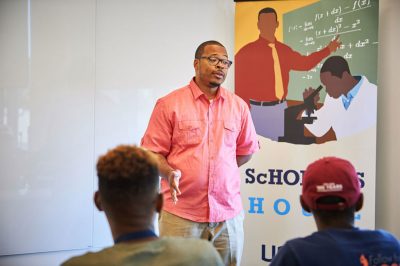
Windows of Opportunity for Black Male Engineers
Erik Hines, associate professor of counselor education in the Neag School’s Department of Educational Psychology, is co-principal investigator of a new project titled “Collaborative Research: Windows of Opportunity-Understanding Black Male Engineers in the Pursuit of Advanced Degrees,” which has been funded nearly $400,000 over four years by the NSF.
The project will center on understanding how to grow the pipeline of Black males acquiring advanced degrees in the field of engineering.
“Given the severe underrepresentation of Black males as engineering faculty and getting advanced degrees, I knew it was important to solve this issue, given my research focus on the academic success of Black males throughout the P-20 educational pipeline,” says Hines, who will work in collaboration with co-principal investigator Jerrod A. Henderson of the University of Houston. “Nationally, only a third of Black males graduate from college [with undergraduate degrees], which translates into less of them going to graduate school, particularly in STEM programs.”
“Nationally, only a third of Black males graduate from college [with undergraduate degrees], which translates into less of them going to graduate school, particularly in STEM programs.”
— Associate Professor Erik Hines
 Hines and Henderson will be examining the decision-making process of Black males who have pursued advanced engineering degrees, as well as the factors that influenced them, in order to better identify how to help Black males persist in engineering majors and in the field — and to eliminate barriers to access going forward. The study will also examine the assets and strengths these Black males possess, as well as the role of self-concept in developing their identity in the realm of engineering.
Hines and Henderson will be examining the decision-making process of Black males who have pursued advanced engineering degrees, as well as the factors that influenced them, in order to better identify how to help Black males persist in engineering majors and in the field — and to eliminate barriers to access going forward. The study will also examine the assets and strengths these Black males possess, as well as the role of self-concept in developing their identity in the realm of engineering.
“We would like to see more Black males in the engineering professoriate as well as [becoming] leaders in industry,” Hines says. “Diversity in this field helps us become a stronger country and compete globally.”
To learn more about this project, read the NSF award abstract in full.
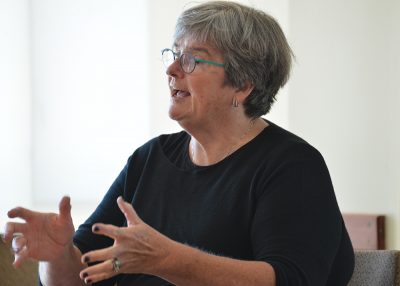
Online Professional Development for Science and Math Teachers
Bianca Montrosse-Moorhead, associate professor of educational psychology, and Suzanne Wilson, Neag Endowed Professor of Teacher Education and head of the Department of Curriculum and Instruction, are co-principal investigators on a NSF-funded research project receiving more than $2.2 million in support over the next four years.
Titled “Integrating Computational Thinking in Mathematics and Science High School Teacher Professional Development,” the project will partner researchers from the Neag School and the Center for Discrete Mathematics and Theoretical Computer Science at Rutgers University to develop a comprehensive online professional development program for high school science and mathematics teachers.
“Many STEM teachers are now asked to integrate computational thinking into their curricula,” says Wilson. “With little knowledge of computational thinking or experience with how to integrate it with mathematics and science concepts, teachers are often left on their own to figure something out. The goal of this project is to get relevant, timely, and useful materials into the hands of teachers.”
The research will study how and under what conditions such materials support the development of teachers’ understanding of computational thinking; improve their instructional practice; and enable computational thinking in their middle and high school students.
“This is an area where we need more research. We still do not know a lot about the connections between professional development in computational thinking, teacher knowledge and practice, and student outcomes.”
— Bianca Montrosse-Moorhead, Associate Professor
“This work is both exciting and complex,” says Montrosse-Moorhead. “This is an area where we need more research. We still do not know a lot about the connections between professional development in computational thinking, teacher knowledge and practice, and student outcomes. That is also part of the complexity of this work. Studying the process of professional development, what happens when teachers go into their classrooms and put computational thinking ideas into practice, and then what happens for their students is more complicated than one would think.”
But the project, Montrosse-Moorhead adds, is not just about doing the research. “At the end of the day, we hope this project will advance our knowledge about embedding computational thinking in mathematics and science classrooms in ways that help teachers and students.”
Access the full award abstract on the NSF website.
Related Stories:
Ensuring School-Age Patients Receive an Education: Meet Natalie Curran
Editor’s Note: This month, Teach.com — an educational web resource for information on becoming a teacher — features Neag School alumna Natalie Curran ’11 (ED), ’12 MA in its “8 Questions” series, which showcases teachers who have transitioned their classroom skills into new and exciting careers in, and beyond, the field of education. Access the original Q&A on Teach.com’s site.

1. What’s your name, location and current profession?
My name is Natalie Curran, and I live in Boston. I am a partnership consultant within the business development team of LearnWell. In this role, I work to build partnerships with hospitals, treatment centers, and residential programs that need an education solution for their school-age patients while they are unable to attend their traditional school settings during treatment.
2. Where did you earn your teaching certification and where did you go to school?
I graduated with my bachelor’s and master’s degrees from the University of Connecticut’s Neag School of Education. My bachelor’s degree is in elementary education. My master’s degree is in curriculum and instruction. I am currently certified to teach in Connecticut, New York, and South Carolina!
3. For how long were you a teacher?
I taught full time for about 1.5 years, beginning my career with LearnWell in August 2012 as a hospital teacher at the Behavioral Health Center at Westchester Medical Center in New York. I taught students in grades K-6 who were hospitalized with diagnoses such as oppositional defiant disorder, autism, ADHD, anxiety disorders, and other generalized mood disorders. In the Spring of 2013 I was asked by LearnWell to help teach at a hospital in South Carolina. There, I taught primarily adolescents in grades 7-12 with anxiety, depression, psychosis, and other behavioral disorders. Later in 2013, I began taking on more managerial responsibilities with LearnWell like recruiting, training, and mentoring of teachers.
“It made me happy to know that these kids still have access to education despite their mental illness and being in the hospital. It is the one normal part of their day between therapy groups, meetings with doctors and psychologists, and not sleeping in their own bed at night.”
4. What was the most rewarding part of being a classroom teacher?
Three things stand out the most. First was recognizing the small successes. I only worked with children for a few weeks at most before they were discharged from the hospital. Having a child who historically struggled in school, disliked their teachers and schoolwork, but was willing to come to my class, sit down, and be somewhat ready to learn was a HUGE success. It definitely didn’t happen on the first day for the majority of the population I worked with, so by the second, third, or fourth day, when they would come for even just a short time, that was amazing! Second, it made me happy to know that these kids still have access to education despite their mental illness and being in the hospital. It is the one normal part of their day between therapy groups, meetings with doctors and psychologists, and not sleeping in their own bed at night. And last, I feel I was able to make school fun for the kids. There was a lot of flexibility in the curriculum, which let me plan very hands-on lessons that were relatable and engaging for the kids. This engagement was so rewarding for me. I wanted them to see that school wasn’t so bad and to help restore their confidence so that they could be successful when they return to their traditional schools.
5. What about classroom teaching did you find most challenging?
Not taking things personally. This was a population going through a very hard time, so often there was aggression, I’d be called names, told I was the worst teacher ever, the list goes on … I needed to stay extra patient, remain calm in my demeanor and response, and begin every day with a clean slate for all.
6. Why did you decide to transition from classroom teaching to your current profession?
I decided to transition primarily because I wanted to continue growing and challenging myself in new ways.
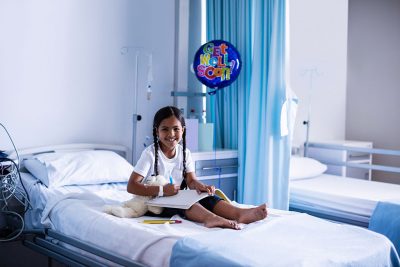
7A. What is the best part of your current job?
The best part of being in business development is that I get to tap into a completely different skill set and become more professionally well-rounded. Instead of working with young children, I am now working with adults. I attend conferences with hospital CEOs, treatment center vice presidents, and medical directors; this is a whole new peer group to converse with, while trying to orchestrate partnerships with their organizations. I enjoy learning, and learning how to expand our company has been a great experience so far. It is very exciting to close a deal with a new partner hospital or treatment center for us to teach in!
7B. What skills did you gain from classroom teaching that have allowed you to excel in your current profession?
I always heard that teachers make great salespeople. We know how to listen to student’s or client’s needs. We know how to speak clearly to an audience and ask all of the right questions. We know how to craft compelling and engaging messages to gain attention, and we know how to be creative on the spot! All of these skills have significantly led to me being successful in my current role. Not to mention, I know the product I am selling very well since I was a hospital teacher to start!
8. What advice would you offer a current teacher who is looking to make a career change to outside of the classroom?
Do it. First off, if any part of you does not want to teach anymore then that isn’t fair to the students you may currently be working with. They deserve 100 percent all of the time. If you still aren’t sure, ask yourself this question (this was the big one for me): ‘In 40 years when I look back on my career, will I regret that I never got out of my comfort zone to try something new?’ I answered yes to this question. I am also very lucky because I was transitioning roles within the same company and I knew I could also always go back to teaching if I missed it too much.
Natalie Curran ’11 (ED), ’12 MA is originally from Rochester, N.Y. After graduating from the University of Connecticut’s Neag School of Education, she moved to New York City to begin her career. Now living in Boston, Curran enjoys spending time with family and friends, playing recreational softball, going bowling, and traveling. Connect with Curran on LinkedIn at linkedin.com/in/natalie-curran-79463682/.
Access the original Q&A featured on Teach.com’s site.
Q&A With James Kaufman: Do Meaningful Work
Editor’s Note: The following Q&A, featuring the Neag School’s James Kaufman, originally appeared on The Readings Lists website.
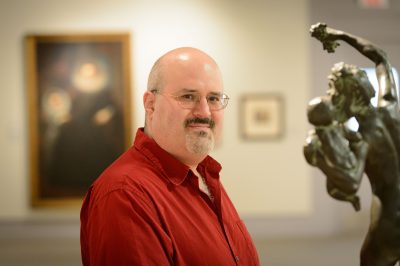
James Kaufman is a professor of educational psychology at the University of Connecticut. He is the author/editor of more than 35 books, including Creativity 101 (2nd Edition, 2016) and the Cambridge Handbook of Creativity (with Robert Sternberg; 2010). He has published 250 papers, including the study that spawned the “Sylvia Plath Effect” and three well-known theories of creativity, including (with Ronald Beghetto) the Four-C Model of Creativity.
Kaufman is a past president of Division 10 of the American Psychological Association. He has won many awards, including Mensa’s research award, the Torrance Award from the National Association for Gifted Children, and APA’s Berlyne and Farnsworth awards. He co-founded two major journals (Psychology of Aesthetics, Creativity, and the Arts; and Psychology of Popular Media Culture) and currently co-edits the International Journal of Creativity and Problem Solving. He has tested Dr. Sanjay Gupta’s creativity on CNN, appeared in the hit Australia show “Redesign Your Brain,” and narrated the comic book documentary “Independents”.
How do you describe your occupation?
I am a professor of educational psychology at the Neag School of Education at the University of Connecticut. My background is more in cognitive psychology (how people think). I study creativity – what it is, how to measure it, the positive outcomes, and how to nurture it. It sounds silly to both creative types and scientific types (the former thinks it’s pointless and the latter think it’s impossible), but my goal is to help creative people. If you can’t measure something, no one (teachers, parents, colleagues) values it as much as they may say they do.
What is something about you that people might find surprising?
I am also a playwright and lyricist. My musical “Discovering Magenta” (music by Michael Bitterman) played NYC in 2015, and I’ve had many short plays produced all over the world. And I wrote a book with my Dad about terrible baseball pitchers.
What are you reading at the moment and what made you want to read it?
I just finished The Likeness by Tana French – she’d been recommended to me by several people because I love thrillers that are also a bit literary and the book did not disappoint (I also enjoy Kate Atkinson). I loved it and will be seeking out more of her work.
What was your favourite book as a child and why?
I tended to love series – so I read all the Wizard of Oz books by L. Frank Baum, all the Three Investigator books by Robert Arthur, and most of the Choose Your Own Adventure books by R.A. Montgomery. When I was 12, I saw the musical “Sweeney Todd” and instantly fell in love with it; I reread the libretto continuously (and still do, to a degree). I also loved the D’Aulaires mythology books.
“I study creativity – what it is, how to measure it, the positive outcomes, and how to nurture it. It sounds silly to both creative types and scientific types (the former thinks it’s pointless and the latter think it’s impossible), but my goal is to help creative people.”
When did you fall in love with psychology?
My parents are psychologists (they write IQ tests) so I was exposed to it from a young age. I never thought I’d become one myself. When I was in college, I read Influence by Robert Cialdini, which felt like I discovered a secret manual on how to understand (and manipulate) people. Even then, I added psychology as a double major to go with creative writing, my true passion (I studied under novelist T. Coraghessan Boyle). But as graduation grew closer and I began thinking about practicalities, I went with psychology. I did grow to fall in love with it when I was mentored by Robert Sternberg at Yale and discovered you could study creativity!
What was the last book you purchased, and why did you buy it?
The New York Times’ Book of the Dead by William McDonald – I have always been fascinated by obituaries and people’s life stories, and it looks amazing. I also just picked up Box Brown’s graphic novels on Tetris and Andre the Giant, as well as a book on Lord Lucan.
What advice would you give to a young aspiring psychologist looking to begin their career?
Do meaningful work that matters to you. That will vary from person to person, of course, so it’s easier to raise cautions. My first work that got any attention was the Sylvia Plath Effect (eminent female poets are more likely to have mental illness than other well-known writers, as well as other highly accomplished women). It was something that the press picked up and it spread a bit. At first, it was cool and fun, but then I began to realize that it wasn’t a good thing. Most people used it to either mock poets, mock psychology, or wonder if they were going to go crazy. It’s easy to study topics that will either be controversial and get you attention or to do straightforward work that will get you a lot of publications. But at the end of the day, you probably won’t feel good about it. Similarly, don’t make your career about attacking the work of other people. When you look back on your career and accomplishments, you want to feel proud – not ashamed.
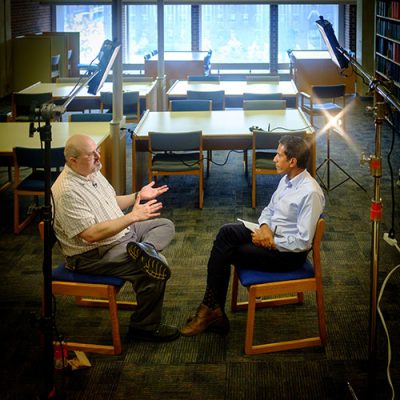
What book have you found most inspiring, what effect did it have on you?
Can I give two that I read within two months of each other? Passage by Connie Willis and Replay by Ken Grimwood. Both books are speculative fiction, with Passage about people studying what happens when you die and Replay exploring what would happen if you could go back and relive the last 25 years while retaining your memories. Both of them made me think about life in general – what has meaning and what does not have meaning, what I want to accomplish or experience in my life, and what ultimately matters.
What’s the most obscure book you own; how did you discover it?
I may have ended up giving it to a friend as a gag gift, but I found a children’s book in a used bookstore about the Donner Party. It was completely earnest and not ironic – it followed a little girl’s doll and minimized the whole cannibalism aspect.
What’s the best book you’ve read in the last six months?
This is a bit of a cheat because I read it about every two months, but Arcadia by Tom Stoppard (a play). Having seen it several times, I can focus on the language or finding connective threads I’ve missed. It’s many different things in one. For one, it’s the most accurate portrayal of academia I’ve found. It also weaves mathematics, Lord Byron, architecture, computer science, and many other topics that are not obviously theatrical. It’s funny, romantic, profound, and tragic. Arcadia ponders whether an idea can ever be truly lost and gone forever, or it will eventually always resurface. It sounds like an intellectual question but is actually handled with quite a bit of emotion – and taps into some of my deepest fears.
“When you look back on your career and accomplishments, you want to feel proud – not ashamed.”
What is your proudest achievement?
That I’m not the workaholic most people assume I am. My wife Allison and I have two great young boys (Asher and Jacob) and a menagerie of animals, and I am close to my family and a small circle of friends. I went to a good grad school, so an awful lot of former classmates and friends have become superstars. It helps put professional accomplishments in perspective. I’m finally at a point where I’m happy with what I’ve done and still love what I do, but work is not my primary source of meaning.
If you were trying to impress a visitor, which book that you own would you leave on the coffee table?
Being embarrassingly honest, one of my own books – either Creativity 101 or the Cambridge Handbook of Creativity.
If an alien landed in your garden, which three books would you gift them to showcase humanity in the best possible way?
Anne Frank: The Diary of a Young Girl, which shows that even in the worst of (human-made) circumstances there can be hope and beauty. Ragtime by E. L. Doctorow, which reflects the potential that we have for co-existing and thriving as a diverse species. Slaughterhouse-Five by Kurt Vonnegut, which shows that we can see time in a nonlinear way, an ability we will likely need to travel through space, thereby making us at least seem a little relevant (a thank-you to my niece Nicole for exploring the ideas behind the last one with me).
In the world of psychology, what current research studies are you most excited about?
There’s a growing body of studies about how creativity can help equity and issues of social justice. I’m excited on both ends – creativity often plays second fiddle to intelligence or personality, and finding a way it can help humanity in its own unique way is important. And, of course, anything that can help people is good regardless of what it is.
Are there any books you haven’t mentioned that you feel would make your reading list?
Bid Time Return (aka Somewhere in Time) by Richard Matheson. I love masters of the mystery/suspense/science fiction story. In addition to Matheson, that would include Robert Bloch, Rod Serling, Henry Slesar, Edward Hoch, plus contemporaries like Harlan Coben, Laura Lippman, Jeffery Deaver, and so many more. Poets such as T. S. Eliot, Emily Dickinson, W. B. Yeats, A. E. Houseman, and so many more.
Which book on your shelf are you most excited about reading next and why?
Life After Life by Kate Atkinson – loved her mysteries and everyone in my family has read and loved it. I’m saving it for when my brain has a little more room in it (although in answering these questions I am realizing how much I haven’t read!).
Access the original post of this interview on The Reading Lists website.
James Kaufman: Do Meaningful Work
The Reading Lists (Neag School’s James Kaufman is interviewed about his work in creativity)
State Continues to Struggle to Recruit Teachers of English Learners
WNPR (Neag School’s Elizabeth Howard is interviewed about recruiting teachers of English learners)
Editorial: Diversify Teaching Programs
Daily Campus (Neag School’s diversity efforts with the Teacher Education Program are featured)
Three Keys to Success for College Freshmen
Hartford Courant (Neag School’s Richard Schwab co-writes Op-Ed on tips for college freshman)
Neag School Accolades – June-August 2018
Congratulations to our Neag School alumni, faculty, staff, and students on their continued accomplishments inside and outside the classroom. If you have an accolade to share, we want to hear from you! Please send any news items and story ideas to neag-communications@uconn.edu.
In addition to the Dean’s Office and Department achievements, explore this edition’s list of Accolades for the following: Faculty/Staff; Alumni; Students, as well as In Memoriam.
Dean’s Office and Departments
The Neag School welcomes four new faculty members this August — two in the Department of Educational Leadership and two in the Department of Curriculum and Instruction. In addition, René Roselle has been named interim director of teacher education for a two-year term. Donald Leu announces his retirement, effective Sept. 1, after 18 years with the Neag School. Read more.
Gladis Kersaint was named to a 44-member advisory search committee to recommend the next president for the University of Connecticut, to replace Susan Herbst, who is ending an eight-year stint as president and going to a faculty position at the Stamford campus.
Department of Curriculum and Instruction (EDCI) and Teacher Education
The Teacher Education program launched a new teacher certification program in Mandarin Chinese, in response to a need for Mandarin elementary and high school teachers at the state and national level. In June, Elizabeth Howard and Michelle Back had testified at the Connecticut State Board of Education in Hartford about the proposed program.
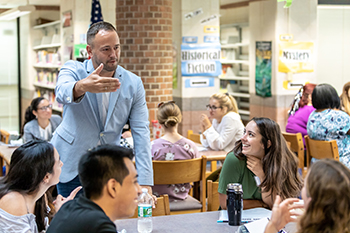
The Teacher Education program, along with the Neag School Alumni Board, hosted a Strong Beginnings Workshop for alumni who are now serving in their first or second-years as teachers. Attendees had the opportunity to work with seasoned educators and administrators, gaining insights to help them navigate their careers as educators. The workshop was held at Lewis Mills High School in Burlington, Conn. See photos from the event.
The Teacher Certification Program for College Graduates (TCPCG) collaborated with the Norwich Free Academy in Norwich, Conn., for a free STEM academy for grades six through eight, while Neag School students in TCPCG got hands-on experience working with the middle-school students. Check out a photo album from the program.
The Neag School’s Reading and Language Arts Center hosted “The Reading Brain’s Lessons for Literacy and Dyslexia,” featuring Maryanne Wolf, an award-winning dyslexia scholar and best-selling author. Organized by Rachael Gabriel, the event was held in May at the Storrs campus. See photos from the event.
Glenn Mitoma and Alan Marcus co-led a workshop in August at the Dodd Center for teachers and administrators in response to the new Connecticut state law mandating Holocaust and genocide education. Requested by the Connecticut State Department of Education, their workshop was one of four held at different locations throughout the state. Watch a video of the workshop, filmed by CT-N.
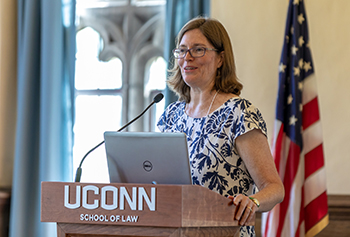
The Neag School co-hosted a Connecticut Dual Language Symposium in July at the UConn School of Law. Co-hosts included Multistate Association for Bilingual Education (MABE) and Dual Language Connecticut Educators (DuLCE). The half-day symposium, co-coordinateed by Elizabeth Howard, was designed to celebrate the successes of existing dual language programs; brainstorm challenges and solutions for expanding dual language education in the state; and promote awareness of resources to support dual language program implementation. The event brought together professionals in bilingual education; leadership teams from school districts; policymakers; and State Department of Education staff. Check out photos from the event.
Department of Educational Leadership (EDLR)
The Center for Education Policy Analysis released three issue briefs over the course of the summer, each authored by current doctoral students. Chelsea Connery ’13 (ED), ’14 MA examined the impact of undocumented status on children’s learning; Alexandra Lamb wrote about preparing school districts for 1:1 technology initiatives; and Samuel J. Kamin’s issue brief focused on current trends in career and technical education.
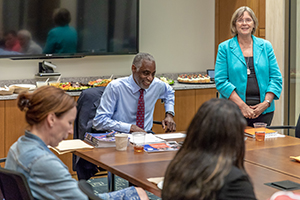
The Department of Educational Leadership hosted the Windham Teacher Leadership Fellows program, which supports the Windham (Conn.) Public Schools in developing and implementing a teacher leadership initiative that aims to provide a sustainable professional development structure in every school in Windham. The program was held on the Storrs campus in June and is entering its third year. See photos from the workshop.
The Executive Leadership Program celebrated the graduation of its 2017-18 cohort in June at the Hartford campus. The event featured James Thompson, superintendent of the Bloomfield (Conn.) Public Schools, as the guest speaker. View photos from the celebration.
Department of Educational Psychology (EPSY)
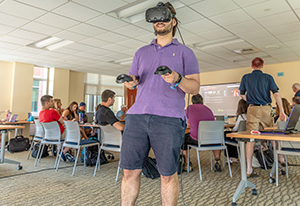
The Neag School hosted the 8th annual Modern Modeling Methods (M3) conference on the Storrs campus in May. M3 is an interdisciplinary conference designed to showcase the latest modeling methods and to present research related to these methodologies. Keynote speakers included Susan A. Murphy from Harvard University, Tenko Raykov from Michigan State University, and Peter Molenaar from Pennsylvania State University. See photos from the conference.
The Two Summers Master’s in Educational Technology Online Program welcomed new students for the 2018-19 cohort and held an orientation week in July on the Storrs campus. In the initial weeklong face-to-face session, the emphasis was on sharing, designing, and reflecting on a variety of potential classroom tools and practices. This included emergent technologies like virtual reality, robots, drones, and more. View photos from the event.
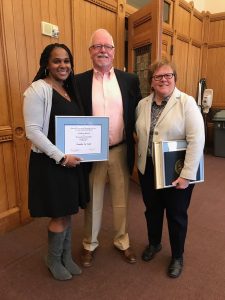
The Renzulli Center for Creativity, Gifted Education, and Talent Development hosted the 41st annual Confratute, a summer institute on enrichment-based differential teaching. The weeklong program was held on the Storrs campus and drew attendees from across the U.S. and 12 countries. Check out photos.
The Neag School’s Center on Postsecondary Education and Disability hosted the 30th Annual Postsecondary Disability Training Institute (PTI), which seeks to assist professionals in meeting the unique needs of college students with disabilities.
Fifty-nine students from across the U.S. participated with the Jack Kent Cooke Foundation’s Young Scholars Program in July on the Storrs campus. The program was launched by the Renzulli Center for Creativity, Gifted Education, and Talent Development. Check out pictures from one of the student/faculty partnerships.
The Neag School’s Center for Behavioral Education & Research hosted its second annual Summer Behavioral Institute — a one-week intensive program presented by national experts designed to develop positive behavior interventions and support (PBIS) skills — on the Storrs campus in July. Check out photos from the program.
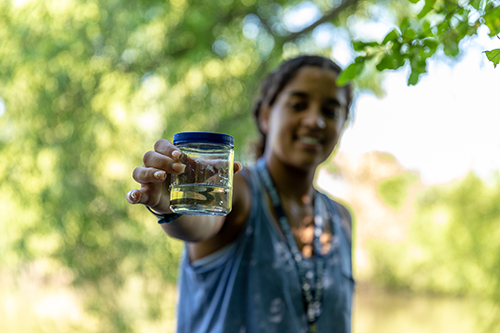
Faculty/Staff

Joseph Abramo co-published with another colleague “What Cooperating Music Teachers Say About Educative Mentoring: A Focus Study Research Project” for the June issue of Research Studies in Music Education. Abramo was also appointed to the editorial board of the Journal of Music Teacher Education. He was one of three faculty members selected for a three-year team out of 32 nominees.
Michele Back co-edited with another colleague a new book Racialization and Language (Routledge, 2018).
Ronald Beghetto was interviewed by the Association for Supervision and Curriculum Development (ASCD) an audio segment titled “Teaching Students to Solve Overwhelming, Complex, and Uncertain Problems,” during which he discussed his recently published book What If? Building Students’ Problem-Solving Skills Through Complex Challenges (ACSD, 2018).
Aarti Bellara presented “Extending the Curve of Factor Models to Accommodate Non-Ignorable Missingness” at the M3 conference on the Storrs campus in May with doctoral students Anthony Gambino and Kevin Agnello. She also presented “Evidence in Teacher Preparation: Establishing Reliability and Content Validity of Educator Preparation Program-Developed Rubrics” with George Michna at the Association for Assessment and Learning in Higher Education Conference in June in Salt Lake City.
Melissa Bray co-published with other colleagues “Academic Stress: What Is the Problem and What Can Educators and Parents Do to Help?” in the July issue of Positive Schooling and Child Development.
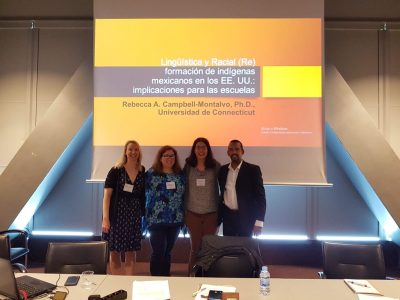
Rebecca A. Campbell-Montalvo co-presented on educational inclusion at the Latin American Studies Association meeting in Barcelona in May.
Todd Campbell co-published with colleagues “Science Education and Student Autonomy” for the June issue of Canadian Journal of Science, Mathematics, and Technology Education. In August, Campbell hosted a two-day teacher professional learning workshop for the U.S. Department of Agriculture and Natural Resources Conservation Academy on the Storrs campus in August. Neag School research assistant and alum Laura Rodriguez ’16 (ED), ’17 MA led the workshop. Campbell also worked closely with the Connecticut State Museum of Natural History to provide teacher curriculum for UConn’s Bug Week, held in July on the Storrs campus.
Milagros Castillo-Montoya presented at University of Southern California’s Equity Minded Teaching Institute in Los Angeles in June.
Sandy M. Chafouleas co-authored “Accessing Behavioral Health Services: Introduction to a Special Issue of Research, Policy, and Practice” for the June issue of School Mental Healthas well as “Examining the Stability of Social, Emotional, and Behavioral Risk Status: Implications for Screening Frequency” in the May issue of School Psychology Quarterly. With D. Betsy McCoach and other colleagues, she also co-published “Methods Matter: A Multi-Trait Multi-Method Analysis of Student Behavior” in the June issue of Journal of School Psychology.

Joseph Cooper penned original commentary for The Conversation about damaging stereotypes regarding black college athletes.
Michael Coyne published “Evaluating the Effects of Supplemental Reading Intervention Within an MTSS or RTI Reading Reform Initiative Using a Regression Discontinuing Design” in the May issue of Exceptional Children.
Morgaen L. Donaldson and Sarah Woulfin co-published “From Tinkering to Going ‘Rogue’: How Principals Use Agency When Enacting New Teacher Evaluation Systems” for the July issue of Educational Evaluation and Policy Analysis. Donaldson also co-published “Principals and Teacher Evaluation: The Cognitive, Relational, and Organizational Dimensions of Working With Low-Performing Teachers” in the June issue of Journal of Educational Administration, and “The Structure of Tracking: Instructional Practices of Teachers Leading Low- and High-Track Classes” in the June issue of American Journal of Education.
Hannah Dostal co-published with a colleague “If You Use ASL, Should You Study ESL? Limitations of a Modality-B(i)ased Policy” for the June issue of Language. In the July issue of Exceptionality, she also co-published “A National Survey of Teachers of the Deaf on Disciplinary Writing.”
Elizabeth Howard and Tom Levine co-published “What Teacher Educators Need to Know About Language and Language Learners: The Power of Faculty Learning Community,” a chapter in the new book What Teachers Need to Know About Language (Multilingual Matters/Channel View Publications, 2018).
James Kaufman, Joseph Renzulli, and Sally Reis,along with other colleagues, co-published “Characteristics of ADHD Related to Executive Function: Differential Predictions for Creativity-Related Traits” for the August issue of the Journal of Creative Behavior.
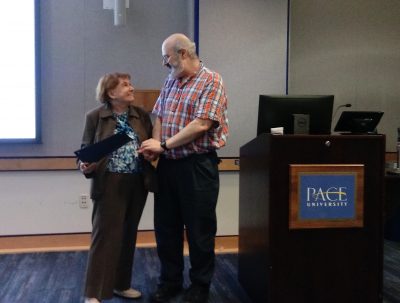
James Kaufman was featured in an article titled “Creativity as a Sliding Maze: An Interview with Dr. James Kaufman” in the May issue of Association for Educational Communications & Technology. Kaufman also co-published with a colleague “The Siren Song of Aesthetics? Domain Differences and Creativity in Engineering and Design” in the May issue of Journal of Mechanical Engineering Science, along with “The Road to Uncreative Science Is Paved With Good Intentions: Ideas, Implementations, and Uneasy Balances” in the July issue of Perspectives on Psychological Science. With his wife, Allison B. Kaufman, he co-published Pseudoscience: The Conspiracy Against Science(MIT Press, 2018), which was featured in a blog titled “The Inquisitive Biologist.” He also co-published “The Relationship Between Emotional Intelligence and Domain-Specific and Domain-General Creativity” in the August issue of Journal of Creative Behavior. In May, he was recognized with the Florence L. Denmark Award, given by Pace University for his work with the American Psychological Association, at the Pace University Psychology Conference in New York, N.Y.
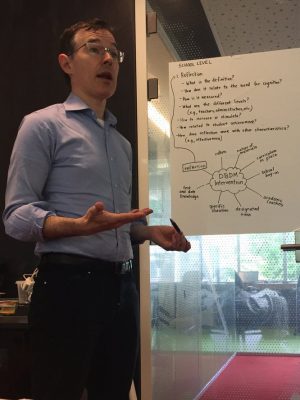
Devin Kearns presented on data-based decision making at the Lorentz Center in Leiden, Nethlerlands, in June. In May, he co-published “Reading Comprehension and Co-Teaching Practices in Middle School English Language Arts Classrooms” in Exceptional Children, and in July he co-published “Envisioning an Improved Continuum of Special Education Services for Students With Learning Disabilities: Considering Intervention Intensity” in Learning Disabilities Research & Practice.
Donald J. Leu co-published with colleagues “Reading to Learn from Online Information: Modeling the Factor Structure” for the July issue of Journal of Literacy Research.
Catherine Little wrote original commentary for the National Association for Gifted Children in July about peer tutoring and gifted learners.
Erik Loken was part of a research team that studied how a responsive parenting intervention can result in lower body mass indexes (BMIs) for young children. The findings were released in the August issue of the Journal of the American Medical Association (JAMA).
Allison Lombardi and former Neag School faculty member Shaun Dougherty, along with graduate student Jessica Monahan, co-authored “Students With Intellectual Disabilities and Career and Technical Education Opportunities: A Systematic Literature Review” for the April issue of Journal of Disability Policy Studies.
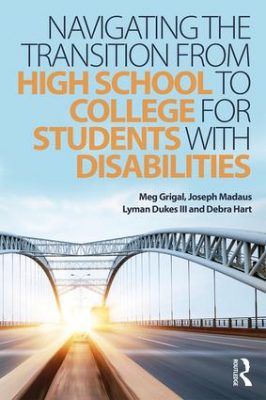
Joseph Madaus edited with other colleagues Navigating the Transition from High School to College for Students with Disabilities (Routledge, 2018). The book features a chapter on increasing college and career readiness for all students, co-authored by Allison Lombardi.
Alan Marcus wrote original commentary for The Conversation about rethinking how the Holocaust is taught.
Betsy McCoach and Aarti Bellara co-authored a paper with current graduate students Graham H. Rifenbark, Sarah D. Newton, Xiaoran Li, Dani Yomtov, andAnthony J. Gambino, as well as alumna Janice Kooken’15 Ph.D., “Does the Package Matter? A Comparison of Five Multilevel Modeling Software Packages?” for the May issue of Journal of Educational and Behavioral Statistics. McCoach also co-published “Stability of Intelligence from Infancy Through Adolescence: An Autoregressive Latent Variable Model” in the July-August issue of Intelligence.
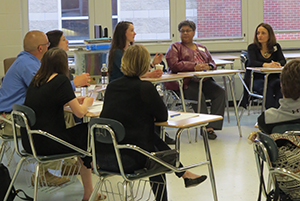
Glenn Mitoma worked with E.O. Smith High School in Mansfield, Conn., this past year on a community outreach program, which received a Humanities Institute Initiative on Campus Dialogues Fellowship. Mitoma trained about 80 students on facilitating deliberative forums in the style of the Kettering Foundation’s National Issues Forums. This summer, they facilitated a forum with most of the E.O. Smith faculty, and with about 30 classes.
Bianca Montrosse-Moorhead is serving as a co-PI on a project that has received $2.2 million in funding from the National Science Foundation. The project, titled “Integrating Computational Thinking in Mathematics and Science High School Teacher Professional Development,” will focus on developing a comprehensive online professional development program for high school science and mathematics teachers.
Joseph Renzulli published “Common Sense About the Under-Representation Issue” for the August issue of the International Journal for Talent Development.
Lisa Sanetti co-published “Evaluating the Fit of Ecological Framework for Implementation Variables” in the June issue of Assessment for Effective Intervention.
Richard Schwab has been appointed to the Dean’s Advisory Board of Boston University’s Wheelock College of Education. He was also nominated and will be voted on for the National Advisory Board of Discovering Amistad in early September.
John Settlage co-published “Writing Worth Reading: Science Methods Textbooks and Science Education Articles” this past spring in Science Education.
George Sugai was a featured presenter during the U.S. Department of Education’s Federal Commission on School Safety field visit to a school in Maryland in May. Read more. Sugai also moderated a panel session for the Office of Special Education and Rehabilitative Services, U.S. Department of Education, that looked at the systems of support to maximize students’ time in instruction. The panel was held in July in Washington, D.C. This August, he spoke at the Southbridge (Mass.) Schools convocation, an event led by alum Jeffrey Villar ’96 MA, ’99 Ph.D.
Jennie Weiner co-published with doctoral student Shannon Holder “Why Lead?”: Using Narrative to Explore the Motivations of Those Aspiring to Be Principals in High Needs Schools” in the July issue of International Journal of Leadership in Education.
Sarah L. Woulfin co-published with a colleague “Editor’s Introduction: Organizational Perspectives on Leadership Development” for the August issue of Journal of Research on Leadership Education. She also published “Mediating Instructional Reform: An Examination of the Relationship Between District Policy and Instructional Coaching” for the August issue of AERA Open.
Students
Ellen Agnello, a second-year doctoral student in educational psychology, published “Why Are We Doing Math in English Class? Building Qualitative Literacy to Improve Expository Text Comprehension” for the July issue of Advancing Education in Qualitative Literacy.
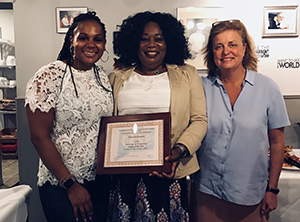
Emily R. Auerbach, a graduate student in educational psychology, co-published with Sandra M. Chafouleas and Neag School alumna Amy M. Briesch ’05 MA, ’09 6th Year, ’09 Ph.D.“State-Level Guidance on School-Based Screening for Social, Emotional, and Behavioral Risk: A Follow-Up Study” for the June issue of School Mental Health.
Tatianna A. Montalvo, an undergraduate student in sport management, was recognized with the Outstanding Senior Women Academic Achievement Award by the UConn Provost’s Office, UConn Alumni, and the Women’s Center. The award recognizes undergraduate and graduate female students who have excelled academically within each School/College and demonstrated high achievement in research and service to the University community.
Francisca Quainoo, a graduate student in educational psychology, was recognized by the Connecticut Association of School Psychologists (CASP) as the UConn Intern of the Year. Quainoospent her internship at East Hartford (Conn.) Middle School, where she has engaged in clinical work and developed innovative programming for students. She was recognized at CASP’s annual meeting in June in Fairfield, Conn.
Alumni
Parag Bhuva ’12 (CLAS), ’13 MA, a world history teacher at Washington Latin Public Charter School in Washington, D.C., traveled this past summer on an expedition to the Arctic with National Geographic and Lindblad Expeditions, through its Grosvenor Teacher Fellowship. Starting in Bergen, Norway, the group traveled up the coast of Norway to Svalbard, an island archipelago in the Arctic to view polar bears, walruses, and seals, and to learn about the ecosystems and culture of the area.

Kristi Gebler Carriero ’04 (ED), ’05 MA, an assistant principal at Norwalk (Conn.) Brien McMahon High School, was hired to serve in the same role at New Canaan High. She began the new role in July.
Yvonne Condell ’58 MA, ’65 Ph.D.was honored in June with a humanitarian and philanthropic award from Minnesota State University, where she was a longtime faculty member.
Viviana Conner ’17 ELP has accepted a position with Hartford (Conn.) Public Schools as the executive director for elementary and middle school grades. Most recently, she was at Greenwich (Conn.) Public Schools, where she was responsible for aligning the world language curriculum to the Connecticut Common Core Standards for English language arts.
Alanna Cooney ’17 (CLAS), ’18 MA is featured in this fall’s recruitment campaign for the Teacher Certification Program for College Graduates (TCPCG). A grad of TCPCG at the Avery Point campus, she will be starting this coming school year as a seventh-grade science teacher at Rogers Park Middle School in Danbury, Conn. Watch her video.
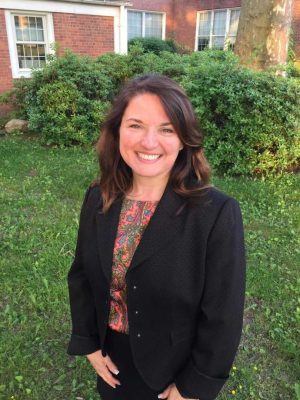
Anna M. Cutaia-Leonard ’07 ELP, ’13 Ed.D. has been named superintendent of Milford (Conn.) Public Schools. Cutaia-Leonard, former superintendent of schools for Regional District 14, and former director of elementary education in Fairfield, started her new position in August.
Jon Dahlquist ’03 (ED) is dean of wellness and athletics at Eagles Catholic High School in Manchester, Conn.
Chris Dailey ’99 MA, associate coach from UConn women’s basketball, was inducted into Women’s Basketball Hall of Fame this June. The event was held at the Tennessee Theater, in Knoxville, Tenn. She became the fifth person from UConn to be inducted. Dailey has coached for 33 seasons in Storrs, having come to Connecticut with Geno Auriemma in 1985. Together, Auriemma and Dailey have combined to lead UConn to an all-time record 11 NCAA National Championships.
Peter Dart ’09 6thYear, ’16 ELP has been named principal of Dorothy C. Goodwin Elementary School in Mansfield, Conn. Most recently, he served as a principal of the Mary Hooker Environmental Science School in Hartford, Conn.
Jamelle Elliott ’96 (BUS), ’98 MA was named associate athletic director for the National “C” Club for UConn student-athletes. Ellliott most recently served as the head women’s basketball coach at the University of Cincinnati from 2009-18 after working on Geno Auriemma’s coaching staff from 1997-09.

Elena Forzani ’16 Ph.D. has been appointed assistant professor of literacy education at Boston University (BU). Prior to joining BU, she was a researcher at Boston College. Forzani began her professional career as a high school English teacher in New Haven, Conn.
Maryanne Garry ’93 Ph.D., a professor at Waikato University in Tauranga, New Zealand, gave a free lecture on the science of memory this August.
Brett Gottheimer ’09 (CLAS), ’09 (ED),’17 6th Year was appointed dean of teaching and learning for Center Woods Upper Elementary School in Weare, N.H. Gottheimer formerly served as the fine arts department head at Pinkerton Academy in Derry, N.H. Prior to his move into school administration, he taught music in high schools and middle schools in Connecticut for 13 years.
Meghan Hanrahan ’02 (CLAS),’04 MA was recognized by Hartford Business Journal as a “40 Under 40” honoree. She is UConn School of Business’ director of the business analytics and project management graduate program at UConn Hartford and Stamford campuses. Hanrahan has worked for UConn for 14 years and served in a variety of roles across the institution. As director, she manages an $8 million program for the school and supports more than 450 students recruited from around the world.
Lynda Mullaly Hunt ’88 (ED), ’97 MS, an author of children’s books, was recognized with a 2018 William Allen White Children’s Book Award for her book Fish in a Tree.
Scott Hurwitz ’93 (CLAS), ’08 6th Year has been appointed principal of Irving A. Robbins Middle School in Farmington, Conn. He most recently served as the acting middle school principal of Gideon Welles School in Glastonbury, Conn.
Brian T. Keating ’93 (ED), ’94 MA has been named the interim program administrator after participating in the Alternative High School Design Team during the 2016-17 school-year to develop the Windrose Program. He joined Greenwich High School in 2001 as an English teacher with the GHS Community Learning Program and served as Clark House assistant dean.
Stephen Kilgus ’06 (CLAS), ’07 MA, ’11 Ph.D., ’11 6th Year is associate professor at the University of Wisconsin-Madison. Prior to UW-Madison, Kilgus worked at the University of Missouri and East Carolina University.

Holly Korona ’13 (ED), ’14 MA and Daniel Bronko ’15 (ED), ’16 MA, who originally became known nationally for having UConn’s mascot Jonathan help with their engagement proposal, celebrated their wedding day with numerous fellow Huskies by their side. Their wedding photos — also featuring Jonathan — made national news in such outlets as SFGate, NBC New York, and the Associated Press.
Wally Lamb ’72 (CLAS), ’77 MA was Norwich Free Academy’s Class of 1969 50th reunion speaker. He was a member of that graduating class, and had served on the faculty as an English teacher for 25 years.
James E. “Jim” Main ’79 MA has been appointed executive vice president for administration and chief financial officer for the University of North Texas Dallas in Dallas. He most recently served in a leadership role at the University of Nebraska.
Tina Mannarino ’02 ELP, ’03 Ph.D. has been appointed superintendent for public personnel services for Westport (Conn.) Public Schools. She previously served as director for the Department of Programs and Services for Young Children and Families for LEARN – Regional Education Service Center in Old Lyme, Conn.
Ralph F. Mayo ’06 ELP has been selected as interim superintendent of schools for Greenwich (Conn.) Public Schools. Mayo, a Greenwich High graduate, has been an educator with Greenwich Public Schools for 41 years, an administrator for 26 years, and, for the past 14 years, principal of Eastern Middle School.
Yvette T. McDonnell ’99 (CLAS), ’01 MA has been named dean of community and work at Sterling College in Craftsbury Common, Vt. McDonnell will oversee a broad range of programs and services that support the well-being and holistic education of Sterling College students.McDonnell has more than 15 years of experience working in the field of student affairs.
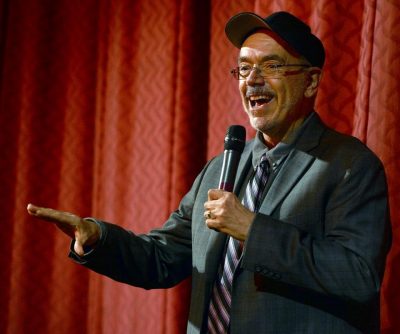
TJ McKenna ’18 Ph.D.has accepted a faculty position at Boston University. Most recently, he was led science education at the Connecticut Science Center in Hartford, Conn.
Ty McNamee ’15 MA was profiled in the Star Tribune out of Wyoming. McNamee is currently a doctoral student at Teachers College, Columbia University in New York, N.Y.
Maureen Mitchell ’76 MA has been installed as president of Sisters of Mercy Northeast Community. Mitchell recently served as Northeast Community’s vice president. Before entering Community leadership, Mitchell ministered for over a quarter century as a clinical pastoral education supervisor — most recently for the Veteran’s Administration New York Harbor Health Care System, where she taught seminarians and military chaplains how to spiritually accompany veterans.
Chantelle (Hennessy) Palumbo ’96 (ED), ’97 MA has accepted a position as the middle school special education supervisor for Norwalk (Conn.) Public Schools. Most recently, she was the special education program administrator for Greenwich High School in Greenwich, Conn.
Sean Palziere ’18 (ED) was featured in UConn Magazine as part of a series welcoming incoming freshmen.
Diana L. Payne ’07 Ph.D., education coordinator at Connecticut Sea Grant, co-edited Exemplary Practices in Marine Science Education (Springer, 2018), the first international book on marine science education and ocean literacy, which will be a resource for undergraduate and graduate courses in science education.
Daniel Pichette ’04 MA, ’11 6th Year is assistant principal for Rockville (Conn.) High School.
Reuben Pierre-Louis ’17 (ED), ’18 MA was welcomed as a newly hired special education teacher at Westhill High School in Stamford, Conn.
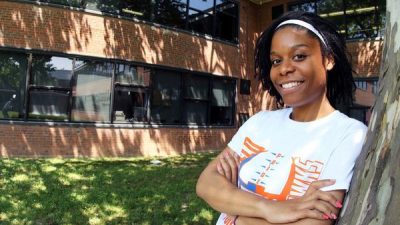
Amanda Powell ’10 (CLAS), ’11 MA was honored as Bloomfield (Conn.) Public School’s Teacher of the Year. At Bloomfield High, Powell teaches algebra, geometry, and AP statistics.
Jessica Raugitinane ’13 (ED), 14 MA was featured on the Alma Exley Scholarship website in a piece about her experience teaching English as a second language in Quito, Ecuador, through a volunteer program called WorldTeach.
Maureen McSparran Ruby ’77 (CLAS), ’78 MS, ’82 DMD, ’07 Ph.D.was recognized by Sacred Heart University with the 2018 Outstanding Administrator Award. She received the award in Fairfield (Conn.) in May. Ruby is the assistant superintendent in the Brookfield (Conn.) Public Schools.
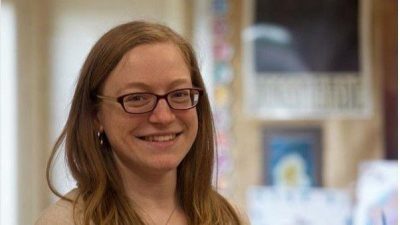
Kelly Shea ’11 (CLAS), (ED), ’12 MAwas recognized as Manchester (Conn.) Public School’s Teacher of the Year. Now in her sixth year of teaching at Manchester High, Shea teaches English, acting, and humanities, a course she co-created with a colleague.
Tyler Sheikh’10 MA has been appointed head coach of men’s soccer at Bates College in Lewiston, Maine. Most recently, Sheikh was the men’s soccer coach at Knox College.
Amanda Slavin’08 (ED), ’09 MA was a featured speaker at the 2018 Big Omaha conference in August in Omaha, Neb.
Emma Smith ’01 (CLAS), ’14 MA, ’18 6th Year published “Exploring Survival: A Student-Led Unit in the Seventh-Grade English Classroom” for the May issue of English Journal.
Joshua Smith ’XX ELP was named superintendent of New Milford (Conn.) Public Schools. Smith, who grew up in Southbury and graduated from Pomperaug High School, started his 22-year education career as a student teacher at Rochambeau Middle School.
Elsie Torres ’18 ELP has been selected as the assistant superintendent of East Hartford (Conn.) Public Schools.
Kristina Wallace ’09 (CLAS), ’12 MA, ’17 6th Year has been hired as the associate principal of Naugatuck (Conn.) High School. Most recently, she was the lead school counselor at Windsor (Conn.) High School.
Christopher Winters ’05 ELP, ’13 Ed.D. has accepted a position with Greenwich (Conn.) Country Day School as head of the new Upper School. Most recently, he served as Greenwich High’s headmaster for the past 10 years.
In Memoriam
Stephen August ’58
Ina Ruth Sarin Beck ’90
Raymond A. Bolduc ’64
Katherine E. Bombara ’61
Joseph D. Bridgeforth ’80
Robert J. Caffrey ’89
Robert Carchman ’88
Norma Cherlin ’73
Jack W. Cohen ’65
Theresa A. Delillo ’58
Roger R. Festa ’82
Eleanor S. Forslund ’51
David A. Fowler ’81
Katherine E. Flynn ’70
Myra S. Froman ’53
June E. Hardy-Greengrass ’78
Lester M. Harston ’59
John J. Kolesko ’79
Dorothy D. Kubachka ’67
Lucille E. Kuhnly ’52
Thomas R. Lawson ’55
Deborah Leff ’56
Romeo J. Martens ’50
Carroll D. Mason ’59
Patricia L. Mereen ’70
George Mitchell ’54
Michelle Musler ’60
Francis E. Nelligan ’59
Edmund J. Nocera ’86
Gregory R. Palmer ’82
Barbara M. Reinsch ’77
Jan Richards ’74
Andrea G. Rosenstein ’78
Dorothy D. Roberts ’69
Lori A. Tomasetti ’94
Sharon S. Torrant ’73
Sally A. Welch ’70
